21. 形容词和副词1
中考英语形容词和副词用法总结
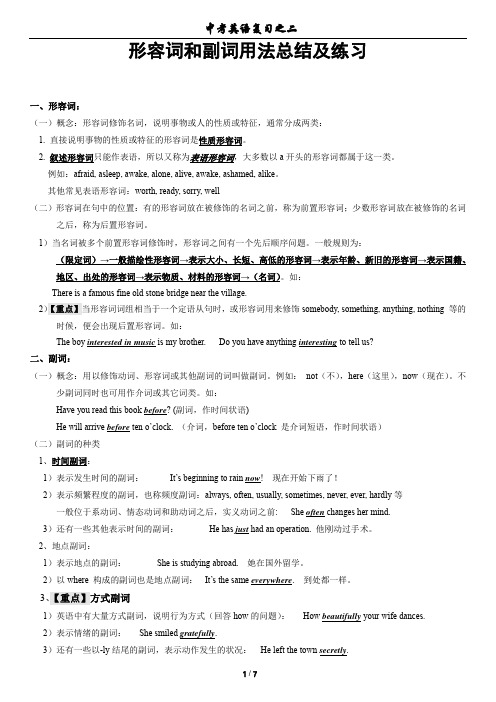
形容词和副词用法总结及练习一、形容词:(一)概念:形容词修饰名词,说明事物或人的性质或特征,通常分成两类:1. 直接说明事物的性质或特征的形容词是性质形容词。
2. 叙述形容词只能作表语,所以又称为表语形容词,大多数以a开头的形容词都属于这一类。
例如:afraid, asleep, awake, alone, alive, awake, ashamed, alike。
其他常见表语形容词:worth, ready, sorry, well(二)形容词在句中的位置:有的形容词放在被修饰的名词之前,称为前置形容词;少数形容词放在被修饰的名词之后,称为后置形容词。
1)当名词被多个前置形容词修饰时,形容词之间有一个先后顺序问题。
一般规则为:(限定词)→一般描绘性形容词→表示大小、长短、高低的形容词→表示年龄、新旧的形容词→表示国籍、地区、出处的形容词→表示物质、材料的形容词→(名词)。
如:There is a famous fine old stone bridge near the village.2)【重点】当形容词词组相当于一个定语从句时,或形容词用来修饰somebody, something, anything, nothing 等的时候,便会出现后置形容词。
如:The boy interested in music is my brother. Do you have anything interesting to tell us?二、副词:(一)概念:用以修饰动词、形容词或其他副词的词叫做副词。
例如:not(不),here(这里),now(现在)。
不少副词同时也可用作介词或其它词类。
如:Have you read this book before? (副词,作时间状语)He will arrive before ten o’clock. (介词,before ten o’clock 是介词短语,作时间状语)(二)副词的种类1、时间副词:1)表示发生时间的副词:It’s beginning to rain now! 现在开始下雨了!2)表示频繁程度的副词,也称频度副词:always, often, usually, sometimes, never, ever, hardly等一般位于系动词、情态动词和助动词之后,实义动词之前: She often changes her mind.3)还有一些其他表示时间的副词:He has just had an operation. 他刚动过手术。
小升初英语复习:形容词、副词

(1) “A + be +形容词比较级+ than + B”意思为“A比B更……”。
如:My pen is cheaper thanyours . 我的笔比你的便宜。
Tom runs faster thanyou. 汤姆比你要跑得快。
(2) 进行选择性比较时,可用“which/ who+be+形容词比较级,A or B ?”表示“A和B中,哪一个/ 谁更……..?”。
如:Who is taller (tall), Lucy or Lily? 露西和丽莉谁更高?(3) “比较级 + and + 比较级”或“more and more +原级”表示“越来越……”如:It becomes warmer and warmer when spring comes.春天来了,天气变得越来越暖和了。
(4) “the +比较级……, the+比较级......”,表示“越……越……”如:The more money you make, the more you spend.钱你赚得越多,花得越多。
温馨提示:a bit, a little, much, a lot, still, even 可修饰形容词或者副词的比较级。
Peter is much taller(tall) than Daming. 彼得比大明高得多。
(三) 最高级用法形容词、副词的最高级形式主要用来表示三者或三者以上人或事物的比较,表示“最……”的意思。
句子中有表示范围的词或短语。
如:of the three, in our class等。
结构:(1) Who + be + the + 形容词最高级,A, B or C? 表示“ABC中谁最…..?”Who is the most beautiful (beautiful)girl, Lily, Lucy or Lingling?丽莉、露西和玲玲谁是最漂亮的?(2) Which + be + the + 形容词最高级,A, B or C? 表示“ABC中哪一个最…..?”Which bag is the heaviest(heavy), the yellow one, the red one or the black one?哪个包包最重,黄色的,红色的还是黑色的?(3) A + 谓语 + the + 形容词/副词最高级 + 表示范围的短语(of/ in…) .表示“A在哪一范围内是最…..?”如:He is the tallest (tall) in our class. 他在我们班里是最高的。
英语语法--形容词与副词

英语语法一形容词与副词来源:普特英语形容词1.1什么是形容词形容词(adjective)是修饰名词表示名词属性的词,常放在它所修饰的名词之前。
如:a lovely baby 一个可爱的婴儿the beautiful picture那幅美丽的图画modern history 现代历史1.2形容词的用法形容词在句中可用作:1淀语He is a good boy他是个好孩子。
The Chinese Communist Party is a great party 中国共产党是伟大的党。
2)表语The film is both moving and instructive.这部电影很感动人,而且富有教育意义。
I am very glad to see you.见到你很高兴。
3)宾语补足语和宾语一起构成复合宾语。
如:Have you got everything ready for the journey?你行装都准备好了吗?We keep our rooms clean and tidy我们经常保持房间的整洁。
4)相当于名词某些形容词前用定冠词the,变成名词化的形容词,可在句中作主语、宾语等。
如:The young are active.青年人积极好动。
(the young作主语)The blind can learn to read with their fingertips.盲人能够用指尖学习阅读书籍。
(the blind 作主语)He has a keen sense of the new他对新鲜事物有敏锐的感觉。
(the new作宾语)[注一]上述三例中的the young =the young people,the blind the Blind people,the new the new things.[注二]在The sun rose red(旭日升起)中的形容词red和Don't marry young(不要早婚)中的形容词young都是主语补足语。
形容词副词比较结构

1.You can sit on this newly bought chair___. C
fort fortable
fortably A. well; well
C. good; well A. correct C. correctness
D.with comfortable B. good; good
A all the 5. At the meeting, they kept ____ time.
A.friend B.friendship C.friendly D.warmly
D 6. They all looked _____ at the master and felt quite _____ .
A. so well B. so good
C. well enough
D. good enough
8.we decided not to climb the mountains because it was raining ____. D A. badly C. strongly B. hardly D. heavily
A 1. This ________ girl is Linda’s cousin. A. pretty little Spanish B. Spanish little pretty C. Spanish pretty little D. little pretty Spanish
D. well; good B. correctly D. correcting
C 2. The apple tastes _____ and sells ___ .
A 3. Your answer sounds _____ .
中考英语复习语法攻关五 形容词和副词
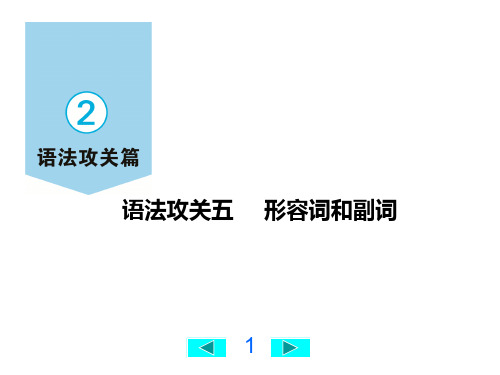
( )5.(2017·北部湾经济区第35题)She closed the door ________ in order not to make her grandpa awake. A.angrily B.loudly C.clearly D.quietly
21
【典题答案】
1.D。考查副词词义辨析。题意“蒂娜,________ 关上门。 你哥哥在为考试而学习。”clearly 清楚地; easily容易地;widely广泛地;quietly安静地。根据 句意可知是安静地关上门,故选D。 2.B。考查形容词和副词的混合辨析。题意“这个 男孩________问我:‘打扰了,你们学校有图书馆 吗?’”polite 礼貌的,形容词;politely 礼貌地, 副词;
4
【典题答案】
1.A。考查形容词词义辨析。题意“一棵________ 树在河流附近。”首先排除C,描述树通常用tall, big,又因前面有不定冠词a,故选A。 2.C。考查形容词词义辨析。题意“——吉米经常 在他的空闲时间做志愿者吗?——是的。他经常为 别人修理________电脑。”根据题意和选项可知, 电脑坏了才需要修理,故选C。
4 sleeping 指“在睡觉的”,作形容词和现在分词
15
2.常见现在分词形容词和过去分词形容词的辨析
ed的形容词 moved 感动的
ing的形容词 moving 移动的;动人的
excited 激动的,兴奋的
exciting 使人激动的;令 人兴奋的
surprised 感到惊讶的
surprising 令人惊讶的
closed 关着的;不公开的 closing 收盘的;结束的
relaxed 悠闲的
松懈的;放松的;
高中英语常见形容词与副词词汇
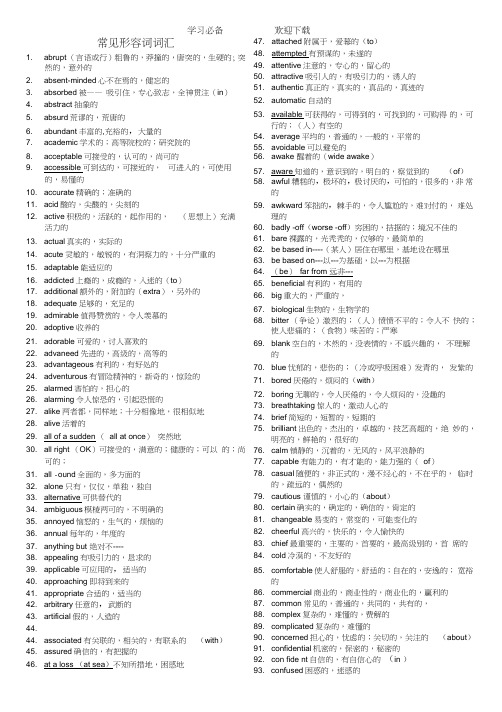
常见形容词词汇1. abrupt (言语或行)粗鲁的,莽撞的,唐突的,生硬的; 突然的,意外的2. absent-minded心不在焉的,健忘的3. absorbed被——吸引住,专心致志,全神贯注(in)4. abstract 抽象的5. absurd荒谬的,荒唐的6. abundant丰富的,充裕的,大量的7. academic学术的;高等院校的;研究院的8. acceptable可接受的,认可的,尚可的9. accessible可到达的,可接近的,可进入的,可使用的,易懂的10. accurate精确的;准确的11. acid酸的,尖酸的,尖刻的12. active积极的,活跃的,起作用的,(思想上)充满活力的13. actual真实的,实际的14. acute灵敏的,敏锐的,有洞察力的,十分严重的15. adaptable能适应的16. addicted上瘾的,成瘾的,入迷的(to)17. additional额外的,附加的(extra),另外的18. adequate足够的,充足的19. admirable值得赞赏的,令人羡慕的20. adoptive 收养的21. adorable可爱的,讨人喜欢的22. advaneed先进的,高级的,高等的23. advantageous有利的,有好处的24. adventurous有冒险精神的,新奇的,惊险的25. alarmed害怕的,担心的26. alarming令人惊恐的,引起恐慌的27. alike两者都,同样地;十分相像地,很相似地28. alive活着的29. all of a sudden (all at once)突然地30. all right (OK)可接受的,满意的;健康的;可以的;尚可的;31. all -ound全面的,多方面的32. alone只有,仅仅,单独,独自33. alternative可供替代的34. ambiguous模棱两可的,不明确的35. annoyed恼怒的,生气的,烦恼的36. annual每年的,年度的37. anything but 绝对不----38. appealing有吸引力的,恳求的39. applicable可应用的,适当的40. approaching即将到来的41. appropriate合适的,适当的42. arbitrary任意的,武断的43. artificial假的,人造的44.44. associated有关联的,相关的,有联系的(with)45. assured确信的,有把握的46. at a loss (at sea)不知所措地,困惑地47. attached附属于,爱幕的(to)48. attempted有预谋的,未遂的49. attentive注意的,专心的,留心的50. attractive吸引人的,有吸引力的,诱人的51. authentic真正的,真实的,真品的,真迹的52. automatic 自动的53. available可获得的,可得到的,可找到的,可购得的,可行的;(人)有空的54. average平均的,普通的,一般的,平常的55. avoidable可以避免的56. awake 醒着的(wide awake)57. aware知道的,意识到的,明白的,察觉到的(of)58. awful糟糕的,极坏的,极讨厌的,可怕的,很多的,非常的59. awkward笨拙的,棘手的,令人尴尬的,难对付的,难处理的60. badly -off(worse -off)穷困的,拮据的;境况不佳的61. bare裸露的,光秃秃的,仅够的,最简单的62. be based in----(某人)居住在哪里,基地设在哪里63. be based on---以---为基础,以---为根据64. (be)far from 远非---65. beneficial有利的,有用的66. big重大的,严重的,67. biological生物的,生物学的68. bitter (争论)激烈的;(人)愤愤不平的;令人不快的;使人悲痛的;(食物)味苦的;严寒69. blank空白的,木然的,没表情的,不感兴趣的,不理解的70. blue忧郁的,悲伤的;(冷或呼吸困难)发青的,发紫的71. bored厌倦的,烦闷的(with)72. boring无聊的,令人厌倦的,令人烦闷的,没趣的73. breathtaking惊人的,激动人心的74. brief简短的,短暂的,短期的75. brilliant出色的,杰出的,卓越的,技艺高超的,绝妙的,明亮的,鲜艳的,很好的76. calm镇静的,沉着的,无风的,风平浪静的77. capable有能力的,有才能的,能力强的(of)78. casual随便的,非正式的,漫不经心的,不在乎的,临时的,疏远的,偶然的79. cautious 谨慎的,小心的(about)80. certain确实的,确定的,确信的,肯定的81. changeable易变的,常变的,可能变化的82. cheerful高兴的,快乐的,令人愉快的83. chief最重要的,主要的,首要的,最高级别的,首席的84. cold冷漠的,不友好的85. comfortable使人舒服的,舒适的;自在的,安逸的;宽裕的86. commercial商业的,商业性的,商业化的,赢利的87. common常见的,普通的,共同的,共有的,88. complex复杂的,难懂的,费解的89. complicated复杂的,难懂的90. concerned担心的,忧虑的;关切的,关注的(about)91. confidential机密的,保密的,秘密的92. con fide nt自信的,有自信心的(in )93. confused困惑的,迷惑的94. conscious意识到,注意到;有知觉的,有意识的95. conservative 保守的96. considerable相当多(或大、重要等)的97. con siderate体谅的,体贴的,考滤周到的,为他人着想的98. consistent坚定的;一致的,始终如一的99. contemporary当代的,现代的100. convenient方便的,便利的,近便的,容易到达的101. cooperative合作的,协作的,同心协力的,配合的102. cost-effective合算的,划算的,成本低的,收效大的103. costly 昂贵的104. cozy舒适的105. creative有创造力的,创造性的106. critical极重要的,关键的,至关紧要的;批评的,批判性的107. cross生气的,恼怒的,十分愤怒的108. crucial关键性的,至关重要的109. cruel残酷的,残暴的,残忍的110. curious 好奇的(about)111. current当前的,现在的,通用的;流通的,流行的112. cute可爱的,漂亮迷人的;精明的,机灵的113. daily每日的,日常的,按日的114. damp潮湿的115. deadly 致命的116. decent像样的,体面的117. defensive戒备的,怀有戒心的;保护的,保卫的118. definite清楚的,明显的,肯定的,确定的119. delicate易碎的;娇弱的;精美的120. demanding要求高的,苛求的121. dense密集的,稠密的;密度大的;浓密的,浓重的;迟钝的,笨拙的122. depressing令人沮丧的,令人消沉的,令人抑郁的123. depressed沮丧的,意志消沉的;萧条的,不景气的124. deserted无人居住的,被抛弃的,被遗弃的125. desperate拼命的,不顾一切的,绝望的,极想,渴望的,极严重的126. detailed详细的,细致的,精细的127. determined坚定的,坚决的;决心,决定128. devastating破坏性的,毁灭性的129. digital数字式的,数码的,数字显示的130. disgusting令人厌恶的,令人气愤的,令人不快的, 极糟的131. distinct不同的,独特的,显著的,有区别的132. diverse不同的,多种多样的133. domestic本国的,国内的;家用的;家庭的134. down沮丧的,情绪低落的,悲哀的135. downhearted情绪低落的,垂头丧气的,悲哀的136. dramatic戏剧性的,戏剧的,突然的,巨大的,令人吃惊的,激动人心的137. dull无聊的,枯燥无味的,无光泽的,阴沉的,昏暗的,迟钝的,萧条的138. dumb傻的,笨的;一时说不出话的话;哑的139. eager热切的,渴望的(for)140. earnest非常认真的,真诚的,诚实的141. easygoing随和的,悠闲的,不慌不忙的142. economical经济的,实惠的,节俭的,节约的,精打细算的143. economic经济的,经济上的,经济学的144. effective有效的,生效的,起作用的145. efficient效率高的,有能力的,高效的146. embarrassed尴尬的,窘迫的147. embarrassing令人难堪的,令人惭愧的,令人难为情的148. energetic精力充沛的,充满活力的,积极的149. enjoyable有趣的,愉快的150. enthusiastic 热情的,热心的(---about sth)151. equivale nt 相等的152. expressive意味深长的,表情丰富的,表现的153. essential必不可少的;极其重要的,本质的,基本的,根本的154. exceptional异常的,罕见的,特别的;杰出的,卓越的155. external外部的,外表的,外面的,外来的156. extinct已灭绝的,,绝种的,绝迹的,消亡的,废除了的157. extraordinary不平常的,特别的,非凡的158. familiar 熟悉的159. fantastic极好的,了不起的,怪诞的,不切实际的160. fasci nated入迷的,极感兴趣的161. fascinating迷人的,极有吸引力的162. fatal致命的163. favorable喜爱的,赞同的164. firm坚定的,坚决的,坚固的,结实的,牢固的165. flexible灵活的,有弹性的166. flue nt 流利的167. formal正式的,正规的168. fortnight两星期,两周169. fragile易碎的,脆弱的,精细的170. frequent经常发生的,频繁的171. fresh新鲜的,清新的,淡的,新近体验的,新近出现的172. frie ndly 友好的,好用的,有用的,无害的environmen tally frien dly 环保173. frustrating令人沮丧的,令人懊恼的174. funny好笑的,奇怪的175. general全体的,总的,普遍的,一般的,大体的,笼统的,大概的,全面的176. generous慷慨的,大方的,丰富的,充足的,大的177. giant巨大的178. global全球的;总的179. glorious 光荣的180. grand壮丽的,堂皇的,重大的,宏大的,极好的,快乐的,出色的181. grateful 感激的182. greedy贪婪的,渴望的183. guilty内疚的;有罪的184. heavy沉重的185. historical历史学的,(有关)历史的,历史题材的186. historic历史上著名的,历史性的187. hollow 空的,中空的188. holy神圣地,圣洁的189. hopeful抱有希望的,满怀希望的190. incredible难以置信的191. independent 独立的192. indifferent漠不关心的,不感兴趣的193. individual个别的,个人的,单独的194. inevitable不可避免的195. informal非正式的196. initial最初的,开始的197. innocent无辜的,清白的,纯真的198. instant立即的,速食的,速溶的199. invaluable极有用的,极宝贵的200. inviting诱人的,吸引人的201. involved与---有牵连的(in),有关的(充当后置定语concern ed)202. joint连接的;共同的203. joyful高兴的,快乐的,令人愉快的204. junior年少的,(地位、职位、级别)低下的(to)205. keen渴望的,热衷于,热情的,喜爱,对----有兴趣(on)206. last (强调)最不可能的,最不适当的He is the last pers on I want to see207. lasting持久的,耐久地208. latest 最新的209. leisurely从容不迫的(地),不慌不忙的,悠闲的,慢慢的(地);审慎的210. liable可能的,大概的;211. life-long 终生的212. live活的,现场直播的,现场演出的,实况转播的213. lively精力充沛的,有趣的,生气勃勃的,活跃热情的214. living活的,活着的215. local本地的,当地的,地方的216. lonely孤独的,寂寞的;偏僻的,人迹罕至的217. loose松的,宽松的218. lovable可爱的,讨人喜欢的,惹人爱的219. lovely可爱的,极好的,令人愉快的,美丽的,有吸引力的,迷人的220. marine海的;海产的221. marvelous极好的,非凡的222. massive大的,大量的,大块的223. mature 成熟的224. meaningful有意义的,意味深长的,重大的,重要的,意义明显的,易于理解的225. meaningless毫无意义的,无价值的,不重要的,意思不明确的226. mean吝啬的,小气的,刻薄的,平庸的,一般的,出身卑贱的,社会地位低下的,出色的,熟练的,平均的,227. mild温和的,和善的228. miserable痛苦的,非常难受的,可怜的,令人不快的229. modest谦虚的,谦逊的,朴素的,些许的,不太大(贵、重要)的230. moral道德上的,有道德的231. motherly慈母般的,母亲的232. motivated有积极性的233. multiple多种多样的,数量多的234. narrow-minded小心眼的,气量小的,狭隘的235. natural自然的,天然的,天生的,本能的236. neat整洁的,整齐的,有条理的,简洁的237. negative否定的,消极的238. neutral中立的,无倾向性的239. no table值得注意的,重要的,显著的241 .noted著名的,闻名的,以---见称的242. noticeable显著的,显而易见的243. numerous众多的,许多的244. objective 客观的245. obligated有义务的,有责任的,必须的246. obvious显然的,明显的,易于理解的247. occupied忙于,使用中,有人使用的(或居住)248. odd奇特的,古怪的249. offensive冒犯的,得罪人的,无礼的;极其讨厌的,令人不适的;攻击性的;进攻型的250. official正式的,官方的,公开的,公务的,官方场合的,公事的,公职的251. offshore海上的,近海的,境外的252. open hearted善良诚恳的253. open开放的,开着的,营业的,公开的,诚恳的,坦诚的,开口的254. open-minded思想开明的,愿意考虑不同意见的255. opposed强烈反对的(to)256. opposite对面的,另一边的,相反的257. optimistic 乐观的258. optional可选择的,选修的259. ordinary-looking 长相一般的260. ordinary普通的,平常的,一般的,平淡无奇的,平凡的261. organized有组织的,系统的,有条理的,有安排的262. original原来的,起初的,最早的,首创的,独创的, 原作的263. outdoor室外的,户外的264. outermost最外边的,最远的265. outer外表的,外边的,外围的266. outgoing外向的,爱交际的,友好的,向外的267. outstanding杰出的,优秀的,出色的,突出的,明显的268. overnight夜间的,晚上的,突然的,很快的;在夜间,在晚上,突然,一夜之间269. painful令人痛苦的,令人难过的,令人难堪的;令人疼痛的;困难的,艰难的270. painstaking需细心的,辛苦的,需专注的271. passive被动的,消极的272. peaceful和平的,安静的,平静的,爱好和平的273. peace-loving 爱好和平的274. peculiar怪异的,奇怪的,不寻常的,特有的275. permanent永久的,长久的276. personal 个人的277. persuasive有说服力的,令人信服的278. pessimistic 悲观的279. physical身体的,物质的,有形的,现实的,物理学的280. plain清楚的,明显的,坦诚的,素的,极普通的,平庸的,相貌平平的/简直(副词)281. pleasant令人愉快的,宜人的,吸引人的,友好的,和善的282. pleasing令人高兴的,令人满意的283. plentiful大量的,充足的,众多的,丰富的284. portable轻便的,手提式的285. positive积极的,乐观的,表示赞同的,拥护的,肯定的;阳性的286. practical切实可行的,实际的,实用的,有用的,真实的287. precious宝贵的,珍贵的,珍奇的288. precise准确的,精确的,确切的,精细的,认真的,一丝不苟的289. predictable可预见的,可预料的,意料之中的290. present现在的,目前的,在场的,出席的291. previous先前,以前的292. priceless无价的,极珍贵的,极重要的293. primary主要的,最重要的,基本的,最初的,最早的,初等教育的294. primitive原始的,早期的,落后的,发展水平低的295. principal最重要的,主要的in principle 原则上,理论上,大体上,基本上296. prior(to)较先于297. private私人的,私下的298. productive多产的,有效益的,富有成效的299. professional职业的,专业的,300. prolonged持久的,长期的301. promising有希望的,有前途的,有出息的302. prompt及时的,准时的,迅速的,敏捷的303. proper适当的,恰当的,正当的,符合规则的304. psychological心理的,精神上的,心理学的305. public公开的,大众的,平民的306. punctual按时的,准时的,守时的307. pure纯的,纯净的,纯真的,纯正的308. purposefuL有意义的,有目的的,果断的309. qualified符合资格的,具备——的知识(技能)的310. quality优质的,高质量的;棒极了311. quick敏捷的,迅速的312. realistic现实的,实际的,逼真的,实事求是的313. reasonable合理的,明智的,合乎情理的,公道的,有理由的314. recreational娱乐的,消遣的315. regional地区的,区域的316. regular有规律的,频繁的,经常发生的,定期的,均匀的,固定的,普通的,有规则的317. relative相关联的,相对的318. releva nt紧密相关的,切题的,有价值的,有意义的319. reliable可信赖的,可依靠的320. reluctant不情愿的勉强的321. remarkable值得注意的,异常的,非凡的322. remote遥远的,偏僻的,远程的323. respectable体面的,得体的,值得尊敬的324. respectful表示敬意的,尊敬的325. respective分别的,各自的326. responsible有责任的,负责的327. rewarding值得做的,有益的,报酬高的328. ridiculous愚蠢的,荒谬的,荒唐的329. right适当的,正好的,恰当的,330. rigid严格的;僵硬的331. rough粗糙的,粗略的,大致的,粗野的,粗暴的,猛烈的,恶烈的,艰难的,令人不快的,讨厌的,不舒服的,味道差的,涩的,刺耳的,令人难受的332. rural乡村的,农村的333. scarce不足的,稀少的,缺乏的334. scared 害怕的335. secure安心的,有把握的,可靠的,安全的,牢靠的,牢固的336. senior级别(地位)高的senior citizen老年人337. sensible明智的,合理的,理智的338. sensitive敏感的,易生气的(to)339. separate单独的,分开的,独立的,不同的,不相关的340. severe十分严重的,严厉的,艰难的,难度很大的341. shabby旧的,破败的,衣着破旧的,342. shallow浅的,肤浅的,浅薄的343. sharp敏锐的,灵敏的,敏捷的,急剧的,骤然的(变化),锋利的344. short不足的,短缺的345. significant有重大意义的,显著的,意味深长的346. silent不说话的,沉默的347. simple简单的,易于理解的,朴素的,简朴的,普通的348. skeptical 怀疑的349. slim苗条的,单薄的;不足的,少的,微薄的350. smooth顺利的,光滑的351. social社会的,社交的,交际的,友好的,群居的352. solid固体的,可靠的,可信赖的,相当不错的,意见一致的,连续的353. solo独自的,单独的354. sound明智的,合理的:可靠的,完好的:健康的:全面的,透彻的,香甜的sound asleep酣睡;睡得沉355. spare备用的,空闲的,空余的,不用的,闲置的356. specific具体的,明确的,特定的,特有的,独特的357. spectacular壮观的,壮丽的,令人惊叹的,精彩的,了不起的358. spiritual精神的,心灵的359. splendid极佳的,非常好的,壮丽的,雄伟的,豪欢迎下载学习必备―华的,华丽的stable 稳重的,稳定的,稳固的,沉稳的steady 持续的,稳定的,稳固的,平稳的,沉稳的, 可靠的steep 陡的,陡峭的;突然的,急剧的 stiff 硬的,僵硬的,生硬的 still 静止的,平静的, straightforward 简单易懂的,坦诚的,坦率的 straight 笔直的,坦诚的,直率的;直接,径直,立 即 stran ge 奇怪的,奇特的,异常的,陌生的 stressed/stressed out 焦虑不安的,心力交瘁的; 紧张 的stressful 压力重的,紧张的striking 引人注目的,异乎寻常的,显著的;标致的, 俊秀的,妩媚动人的strong 强壮的;坚强的;强大的;稳固的;强烈的 subjective 主观的 suburban 郊区的,城外的 sudden 突然的 suitable 合适的,适宜的 superior 在级别、重要性或职位上更高的,有优越 感的,(在品质上)更好的,占优势的 super 顶好的,超级的/(副)特别,格外 superb 极佳的,卓越的,质量极高的 supportive支持的;同情的;鼓励的 suspicious 令人怀疑的,可疑的;怀疑的,不信任的 (of )swift 敏捷的,迅速的,矫健的 talkative 爱多说话的,健谈的,多嘴的 tasty 美味的,可口的,好吃的 temporary 短暂的,暂时的,临时的 ten se 神经紧张的,令人紧张的,绷紧的 terrible 非常讨厌的,令人极不快的,可怕的,非常 严重的,劣质的terrific 极好的,绝妙的,了不起的,很大的,异乎 寻常的 thick 厚的;浓的;茂密的;浓重的;能见度低的 thin 薄的;瘦的;稀薄的;淡的; thorough 彻底的,完全的,深入的,细致的 thoughtful 体贴的,关心别人的,关切的,沉思的, 深思的,深思熟滤的 thrilled 非常兴奋的,极为激动的thrilling 惊险的,紧张的,扣人心弦的 tidy 整洁的,整齐的,井然有序的 tight 紧的,紧身的,不松动的,难解开的,严密的, 绷紧的,拮据的,憋气的timely 及时的,适时的 top (级别、位置或程度)最高的,很好的,极棒的 tough艰苦的;艰难的,棘手的;严厉的,强硬的; 坚强的,能吃苦耐劳的,粗暴的,粗野的,坚固的, 不幸的,倒霉的 traditional 传统的,习俗的,惯例的 tragic 悲剧的,悲惨的,可悲的 401. transparent 透明的,易识破的,易懂的402. tremendous 巨大的;极大的;极好的,了不起的, 精彩的403. true 符合事实的,真实的 be true for sth /The sameistrue of sth 404. trying 令人厌烦的,难对付的 405. typical 典型的,特有的,一贯的(It 'typical of sb to dosth 某人一贯/总是做某事)406. unbelievable 难以置信的,难以相信的,惊人的407. unconcerned 不关心的,无兴趣的;冷淡的,漠视的, 漫不经心的408. understanding 善解人意的,富有同情心的,体谅人 的,宽容的409. unforgettable 难以忘怀的,令人难忘的 410. unfavorable 不利的,令人不快的,不适宜的 411. unique 独特的,唯一的412. universal 普遍的,通用的;宇宙的 413. unpleasant 令人不快的,不舒服的,,讨厌的,使人 不愉快的 414. unusual 不寻常的,罕见的,独特的,与众不同的 415. upset 难过的,不高兴的,沮丧的 416. upsetting 令人不快的,令人忧虑的,令人苦恼的 417. urban 城市的,都市的,城镇的 418. urge nt 紧急的;迫切的,急切的 419. usable 可用的,能用的 420. useful 有用的,有帮助的,有益的 421. usual 通常的,寻常的,惯常的 422. vacant (座位、旅馆房间或房屋)空的,未被占用 的,(职位)空缺的;呆滞的,茫然的 423. vague 模糊的,不明确的 424. vain 徒劳的,无效的 425. valid 有效的,有根据的;正当的,合理的 426. valuable 很有用的,很重要的,宝贵的,很值钱的, 贵重的 427. valueless 没有价值的,不值钱的,无用的 428. various 各种各样的,各种不同的,多姿多彩的 429. vast 巨大的,大量的,辽阔的 430. violent 暴力的,强暴的,强烈的,猛烈的,剧烈的 431. virtual 模拟的,虚拟,实际上的,事实上的 432. visible 看得见的,可见的,明显的 433. visual 视觉的,视力的 434. vital 必不可少的,对---极重要的 435. vivid 生动的,清晰的,逼真的,鲜明的,耀眼的, 鲜艳的,强烈的436. warm-hearted 热心肠的,友好的,富有同情心的437. weak 虚弱的,弱的,无力的,差的 438. well done (食物)熟透的,煮透的,烧烂了的439. well in formed 见多识广的,知识渊博的,消息灵通 的 440. well off 富有的,富裕的(better-off )441. well-educated 受过良好教育的,有教养的 442. well-meant 善意的,好心好意的 443. well -o-do 有钱的,富有的,富裕的444. well 健康的,身体好的360.361.362. 363. 364. 365.366. 367.368. 369.370.371.372.373.374.375. 376. 377.378.379.380.381.382. 383.384.385. 386. 387. 388. 389. 390. 391. 392. 393. 394. 395. 396. 397.398.399.400.学习必备___ 欢迎下载445. worn out疲惫不堪的,筋疲力尽的(tired out);破烂不堪的,废旧的446. worthless没用的,无价值的,不中用的,品质坏的。
形容词和副词比较级和最高级(21张)

练习
原级
fast
比较级
faster
最高级
fastest shortest biggest thinnest funniest
short
big thin funny heavy
shorter
bigger thinner funnier heavier
heaviest
most expensive best
expensive
good
more expensive
better
原级
比较级
最高级
good/well → better
→ best
borst
many/much→ more → most little → less → least
far → farther
→
farthest
worst
不规则变化,要多加注意呀!
farther more farthest
原级 1) big 2) thin 比较级 big ger thin ner 最高级 big gest thin nest
5 . 多音节词和部分双音节词在词前加more 或most。
原级 比较级 最高级 most beautiful 1) beautiful more beautiful 2) comfortable more comfortable most comfortable
3. 以“辅音字母+ y”结尾的双音节词,先改y为i, 再加-er或-est。 原级 1)early 比较级 ier early 最高级 iest early
2) happy
happy ier
happy iest
4. 重读闭音节词末尾只有一个辅音字母时, 先双 写这个辅音字母, 再加-er或-est。
小学英语语法——形容词与副词知识点讲解+练习

形容词和副词一、形容词、副词概述1、形容词定义:形容词(adjective),简称adj,用来修饰名词或代词,表示人或事物的性质、状态和特征。
2、副词定义:副词(adverb),简称adv,用来修饰动词、形容词或副词,表示时间、频率、范围、语气、程度等。
二、形容词、副词考点纵览三、综合练习( ) 1. How beautifully she sings! I have never heard _____ voice.A. a betterB. a bestC. the betterD. the best ( ) 2. She looks very _____ but I can’t remember her name.A. similarB. familiarC. friendlyD. strange ( ) 3. Children all looked _____ at the broken model plane and felt quite _____.A. sad; sadB. sadly; sadlyC. sad; sadlyD. sadly; sad( ) 4. The child dreamed that he had once lived in a _______ house in the forest.A. wooden pretty littleB. little pretty woodenC. pretty little woodenD. wooden little pretty( ) 5. ---Which team is _______ to win the game?---I don’t know, but I’ve found _______ for ours to win.A. probable; it unlikelyB. likely; it possibleC. possible; it possibleD. likely; it possibly( ) 6. With the development of the Internet, _______ communication is done by regular mail.A. lessB. moreC. littleD. few( ) 7. ---If you don’t like the red coat, take the blue one.---OK, but do you have ______ size in blue? This one’s a bit tight for me.A. a bigB. a biggerC. the bigD. the bigger( ) 8. If there were no examinations, we should have ______ at school.A. the happiest timeB. a more happier timeC. much happiest timeD. a much happier time( ) 9. This dress is prettier, but it costs ______ that one.A. twice more thanB. twice as much asC. as much twice asD. twice so much as( ) 10.________students are required to take part in the boat race.A. Ten strong young ChineseB. Ten Chinese strong youngC. Chinese ten young strongD. Young strong ten Chinese( ) 11. Allen had to call a taxi because the box was ____to carry all the way home.A. much too heavyB. too much heavyC. heavy too muchD. too heavy much( ) 12. Our neighbor has ________ours.A. as a big house asB. as big a house asC. the same big house asD. a house the same big as( ) 13. We were in ________when we left that we forgot the airline tickets.A. a rush so anxiousB. a such anxious rushC. so an anxious rushD. such an anxious rush( ) 14. ---I was riding along the street and all of a sudden, a car cut in and knocked me down.---You can never be ________careful in the street.A. muchB. veryC. soD. too( ) 15. ---You don’t look very ________.Are you ill?---No,I’m just a bit tired.A. goodB. wellC. strongD. healthy( ) 16. Four of Robert’s children were at the party,including ________, Luke.A. the eldestB. an oldest oneC. the oldD. an old one( ) 17. Many students signed up for the ________race in the sports meeting to be held next week.A. 800-metre-longB. 800-metres-longC. 800 metre lengthD. 800 metres length( ) 18. It’s always difficult being in a foreign country,________if you don’t speak the language.A. extremelyB. naturallyC. basicallyD. especially( ) 19. In recent years,travel companies have succeeded in selling us the idea that the further we go,__________.A. our holiday will be betterB. our holiday will be the betterC. the better our holiday will beD. the better will our holiday be( ) 20. When he heard a cry for help, he ran out as ________ as he could.A. hardlyB. quicklyC. finallyD. slowly( ) 21. “Our team is _____ to win the match.” “Really? But I don’t think so.”A. easyB. difficultC. possibleD. sure( ) 22. A ______ road goes ______ from one place to another.A. straight; straightB. straightly; straightlyC. straight; straightlyD. straightly; straight( ) 23. “This book is ______ more useful for us students.” “Yes, but it is _______ too difficult.”A. quite; quiteB. much; ratherC. rather; quite D quite; much( ) 24. There was a ______ change in the weather, and the rain came pouring down.A. quickB. slowC. fastD. sudden( ) 25. You can speak ______ in front of him, but you can’t eat ______ in his restaurant.A. freely; freelyB. free; freelyC. freely; freeD. free; free( ) 26. Tom will not be at the picnic, ______ to the family’s disappointment.A. muchB. moreC. too muchD. much more( ) 27. --- I have seen so little of Mike ______. Is he away on business?--- Oh, no. He just leaves for his office early and comes back very ______.A. later; latelyB. later; laterC. lately; lateD. late; lately( ) 28. From his ______ voice on the phone I know everything is well under way.A. satisfactoryB. satisfyingC. satisfiedD. satisfaction( ) 29. In ______ Chinese culture, marriage decisions were often made by parents for their children.A. traditionalB. historicC. peacefulD. civil( ) 30. The houses in the village are ______ built of wood and hay.A. mostB. almostC. nearlyD. mostly( ) 31. --- What do people wear when they go to the theatre?--- Well, it isn’t very ______. People can wear anything they like.A. normalB. certainC. modernD. simple( ) 32. Mary’s biology is ______ than ______ in the class.A. a lot of better; anyone else’sB. far better; anyone’s else’sC. much better; anyone elseD. a lot better; anyone else’s( ) 33. We decided not to climb the mountains because it was raining ____.A. badlyB. hardlyC. stronglyD. heavily( ) 34. Paris is one of _____ cities in the world.A. more beautifullyB. more beautifulC. the most beautifullyD. the most beautiful ( ) 35. Are you going to leave______?A. the open windowsB. the windows openingC. the windows openD. the windows opened( ) 36. Bob never does his homework _____ Mary, so he makes lots of mistakes.A. so careful asB. as carefully asC. carefully asD. as careful as.( ) 37. My sister is good at sports. She can jump ____ than me.A. highestB. very highC. too highD. much higher ( ) 38. When spring comes, the trees get ____.A. green and greenB. green and greenerC. greener and greenD. greener and greener( ) 39.He works very ___________.He _____________has a rest on Sundays.A. hard; hardlyB. hardly; hardC. hard; hardD. hardly; hardly( ) 40.He learns Russian_____________.A. goodB. niceC. wellD. fine( ) 41.The boy didn’t run______________ to catch the bus.A. fast enoughB. enough fastC. quick enoughD. enough quickly ( ) 42.Eating _____________ is bad for our health.A. much tooB. too muchC. too moreD. too many( ) 43.Have you ever seen ______________ big panda before?A. a suchB. such aC. so aD. as( ) 44.He looks very _____________ today.A. worriedB. worryC. worryingD. to worry( ) 45.Listen to me. I have _____________ to tell you.A. important somethingB. important anythingC. something importantD. anything important( ) 46. ---How ___ can you finish the drawing?--- In ten minutes.A. longB. often.C. soonD. rapid( ) 47. This book is _____ worth seeing again.A. veryB. quiteC. wellD. much( ) 48. My _____ brother is three years ____ than I .A. old; olderB. elder; olderC. older; elderD. old; elder( ) 49. We felt ___ after we watched the ___ football match.A. exciting; excitedB. excited; excitingC. excited; excitedD. exciting; exciting( ) 50. The old man lived ____ in the house, but he didn’t feel___.A. lonely; lonelyB. alone; lonelyC. alone; aloneD. lonely; alone小学英语语法——形容词与副词知识点讲解+练习参考答案1. A2.B3.D4.C5.B6.A7.B8.D9.B 10.A 11. A 12.B 13.D 14.D 15.B 16.A 17.A 18.D 19.C 20.B 21. D 22.A 23.B 24.D 25.C 26.A 27.C 28.C 29.A 30.D 31. B 32.D 33.D 34.D 35.C 36.B 37.D 38.D 39.A 40.C 41. A 42.B 43.B 44.A 45.C 46.C 47.C 48.B 49.B 50.B11。
高考100个高频形容词和副词
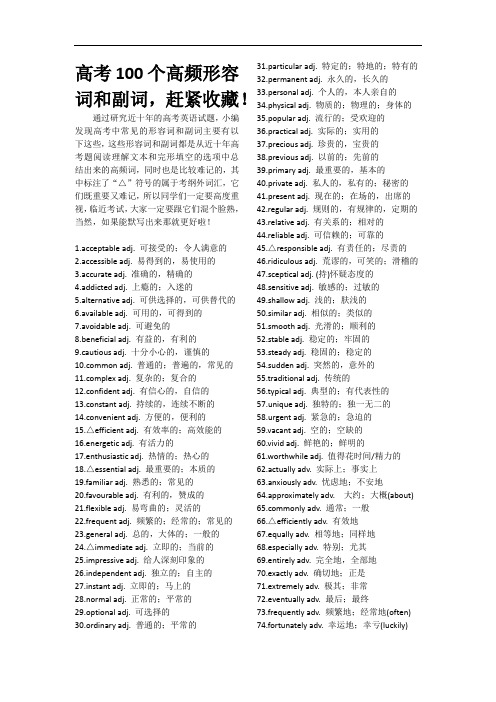
高考100个高频形容词和副词,赶紧收藏!通过研究近十年的高考英语试题,小编发现高考中常见的形容词和副词主要有以下这些,这些形容词和副词都是从近十年高考题阅读理解文本和完形填空的选项中总结出来的高频词,同时也是比较难记的,其中标注了“△”符号的属于考纲外词汇,它们既重要又难记,所以同学们一定要高度重视,临近考试,大家一定要跟它们混个脸熟,当然,如果能默写出来那就更好啦!1.acceptable adj. 可接受的;令人满意的2.accessible adj. 易得到的,易使用的3.accurate adj. 准确的,精确的4.addicted adj. 上瘾的;入迷的5.alternative adj. 可供选择的,可供替代的6.available adj. 可用的,可得到的7.avoidable adj. 可避免的8.beneficial adj. 有益的,有利的 9.cautious adj. 十分小心的,谨慎的mon adj. 普通的;普遍的,常见的 plex adj. 复杂的;复合的 12.confident adj. 有信心的,自信的 13.constant adj. 持续的,连续不断的 14.convenient adj. 方便的,便利的 15.△efficient adj. 有效率的;高效能的 16.energetic adj. 有活力的17.enthusiastic adj. 热情的;热心的 18.△essential adj. 最重要的;本质的 19.familiar adj. 熟悉的;常见的 20.favourable adj. 有利的,赞成的 21.flexible adj. 易弯曲的;灵活的22.frequent adj. 频繁的;经常的;常见的 23.general adj. 总的,大体的;一般的 24.△immediate adj. 立即的;当前的 25.impressive adj. 给人深刻印象的 26.independent adj. 独立的;自主的 27.instant adj. 立即的;马上的 28.normal adj. 正常的;平常的 29.optional adj. 可选择的30.ordinary adj. 普通的;平常的31.particular adj. 特定的;特地的;特有的 32.permanent adj. 永久的,长久的 33.personal adj. 个人的,本人亲自的 34.physical adj. 物质的;物理的;身体的 35.popular adj. 流行的;受欢迎的 36.practical adj. 实际的;实用的 37.precious adj. 珍贵的,宝贵的 38.previous adj. 以前的;先前的 39.primary adj. 最重要的,基本的40.private adj. 私人的,私有的;秘密的 41.present adj. 现在的;在场的,出席的 42.regular adj. 规则的,有规律的,定期的 43.relative adj. 有关系的;相对的 44.reliable adj. 可信赖的;可靠的45.△responsible adj. 有责任的;尽责的 46.ridiculous adj. 荒谬的,可笑的;滑稽的 47.sceptical adj. (持)怀疑态度的 48.sensitive adj. 敏感的;过敏的 49.shallow adj. 浅的;肤浅的 50.similar adj. 相似的;类似的 51.smooth adj. 光滑的;顺利的 52.stable adj. 稳定的;牢固的 53.steady adj. 稳固的;稳定的 54.sudden adj. 突然的,意外的 55.traditional adj. 传统的56.typical adj. 典型的;有代表性的 57.unique adj. 独特的;独一无二的 58.urgent adj. 紧急的;急迫的 59.vacant adj. 空的;空缺的 60.vivid adj. 鲜艳的;鲜明的61.worthwhile adj. 值得花时间/精力的 62.actually adv. 实际上;事实上 63.anxiously adv. 忧虑地;不安地64.approximately adv. 大约;大概(about) monly adv. 通常;一般 66.△efficiently adv. 有效地 67.equally adv. 相等地;同样地 68.especially adv. 特别;尤其 69.entirely adv. 完全地,全部地 70.exactly adv. 确切地;正是 71.extremely adv. 极其;非常 72.eventually adv. 最后;最终73.frequently adv. 频繁地;经常地(often) 74.fortunately adv. 幸运地;幸亏(luckily)75.generally adv. 一般地;通常地76.gradually adv. 逐渐地77.hardly adv. 几乎不;简直不78.increasingly adv. 渐增地79.mainly adv. 大体上;主要地80.necessarily adv. 必然地;必需地81.merely adv. 仅仅;只不过(only/simply)82.narrowly adv. 勉强地;差点儿83.naturally adv. 自然地;天生地84.nervously adv. 紧张地85.obviously adv. 显而易见地(clearly)86.△occasionally adv. 偶尔;间或87.partly adv. 部分地;在一定程度上88.practically adv. 实际地,事实上;几乎89.precisely adv. 精确地;确切地90.properly adv. 正确地;恰当地91.punctually adv. 准时地92.rarely adv. 很少;难得93.reasonably adv. 有理地;合理地94.relatively adv. 相对地;比较而言95.simply adv. 简单地;仅仅,只不过96.skillfully adv. 熟练地97.slightly adv. 略微;稍微98.successfully adv. 成功地99.surprisingly adv. 出乎意料地100. willingly adv. 乐意地。
语文总结副词和形容词这类词的叠词和单词在语意上的区别

语文总结副词和形容词这类词的叠词和单词在语意上的
区别
语文中的副词和形容词是两类重要的词性,它们都可以形成叠词和单词形式。
以下是对这两类词的叠词和单词在语意上的区别的总结:
1. 副词的叠词和单词在语意上的区别
副词叠词:副词叠词通常用于加强语气或表达更强烈的状态,常见的副词
叠词有“渐渐”、“偷偷”、“纷纷”等。
使用副词叠词可以使句子更加生动有力,加强描述的表达效果。
副词单词:副词单词通常是单音节或双音节的简单形式,如“快”、“慢”、“对”等。
副词单词通常用于修饰动词或形容词,表示程度、时间、方式等,使句子更加准确具体。
2. 形容词的叠词和单词在语意上的区别
形容词叠词:形容词叠词通常用于加强描述的语气或表达更强烈的情感,
常见的形容词叠词有“高高”、“小小”、“闪闪”等。
使用形容词叠词可以使句子更加生动形象,增强语言的艺术感。
形容词单词:形容词单词通常是单音节或双音节的简单形式,如“大”、“小”、“好”等。
形容词单词通常用于修饰名词或代词,表示事物的性质、状态、特征等,使句子更加具体形象。
总的来说,叠词形式的副词和形容词可以加强表达效果,使句子更加生动有力;而单词形式的副词和形容词则更加简单明了,用于准确具体地描述事物或状态。
在实际应用中,应根据语境选择合适的词性形式,以达到更好的表达效果。
(完整版)形容词与副词的用法
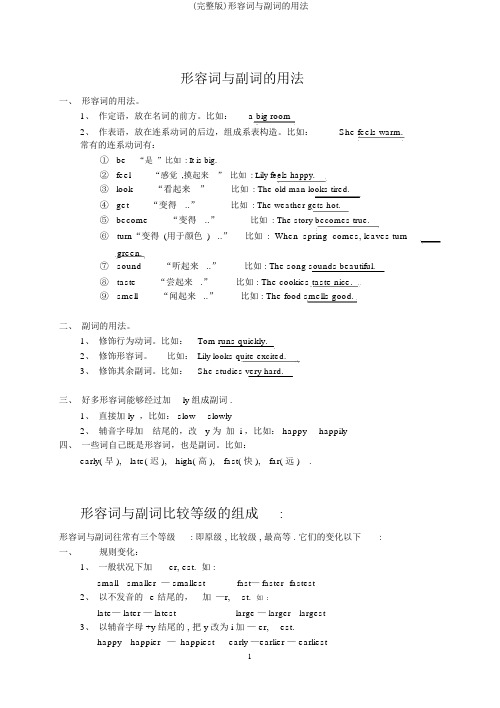
形容词与副词的用法一、形容词的用法。
1、作定语,放在名词的前方。
比如: a big room2、作表语,放在连系动词的后边,组成系表构造。
比如:She feels warm.常有的连系动词有:①be“是”比如: It is big.②feel“感觉,摸起来” 比如: Lily feels happy.③look“看起来”比如: The old man looks tired.④get“变得..”比如: The weather gets hot.⑤become“变得..”比如: The story becomes true.⑥turn“变得(用于颜色) ..” 比如: When spring comes, leaves turngreen.⑦sound “听起来 ..”比如 : The song sounds beautiful.⑧taste “尝起来 .”比如 : The cookies taste nice.⑨smell “闻起来 ..”比如 : The food smells good.二、副词的用法。
1、修饰行为动词。
比如:Tom runs quickly.2、修饰形容词。
比如:Lily looks quite excited.3、修饰其余副词。
比如:She studies very hard.三、好多形容词能够经过加ly 组成副词 .1、直接加 ly ,比如: slow----slowly2、辅音字母加结尾的,改y 为加 i ,比如: happy----happily四、一些词自己既是形容词,也是副词。
比如:early( 早 ), late( 迟 ), high( 高 ), fast( 快 ), far( 远 ).形容词与副词比较等级的组成:形容词与副词往常有三个等级: 即原级 , 比较级 , 最高等 . 它们的变化以下:一、规则变化:1、一般状况下加 ----er, est. 如 :small---smaller — smallest fast— faster--fastest2、以不发音的 e 结尾的,加—r, ---st.如:late— later — latest large — larger---largest3、以辅音字母 +y 结尾的 , 把 y 改为 i 加— er, ---est.happy---happier—happiest early —earlier — earliest14、以重读闭音节结尾且末端只有一个辅音字母的,双写末端辅音字母再加—er,--est.big — bigger — biggest hot — hotter —hottest fat —fatter — fattestthin — thinner —thinnest5、部分双音节和所有多音节形容词与副词在前方加more, most.形容词加 ly 组成的副词也是在前方加more,most.careful---more careful---most carefulwidely---more widely---most widelyquickly---more quickly—most quicklypopular — more popular---most popular二、不规则变化:原级比较级最高等good, well 好的better bestbad, badly, ill 坏的,糟糕worse worst的,差的many, much 多more mostlittle 少less leastfar 远farther farthest形容词与副词比较等级的用法:1、非常较对象时,用原级。
形容词副词的比较级和最高级

形容词副词的比较级和最高级形容词和副词一形容词、副语的句法功能形容词和副词都是起修饰作用的词。
它们各自的功能如下:词类功能例句Han Mei is abeautifulgirl.定语The meal is verydelicious.形容词表语We must keep the classroomclean.宾语补足语Bill gets uplateonweekends.状语Lifehereis rich and interesting.副词后置定语表语Class isover.不少学生对如何排列形容词的词序颇感困惑。
在此,我们向同学们介绍一个简易的记忆方法。
请你记住“限观形龄色国材”,如果这几个字不好记,你就记“县官行令谢国财”。
口诀说明例词代表限定词,包括冠词、指示代词、县(限)形容词性物主代词、名词所有格、数the,this,that,my,Tom's,two词等。
官(观)代表观点的描绘性描述词。
fine,beautiful,interesting代表表示大小、长短、高低及形状的行(形)small,tall,high,round描述词。
令(龄)代表年岁、新旧的描述词。
young,old,new谢(色)代表颜色的形容词。
red,black,white代表国籍、地区、出处的形容词(或国English,American,Japan名词)。
财(材)代表中心名词构成材料的形容词。
wooden,stone,plasticThere is a fine old _______ bridge near the village.村庄邻近有一座摩登的现代石桥。
I bought a ______ blue plastic pencil box yesterday.昨天我买了一个便宜的蓝色塑料铅笔盒。
They have got such a ______ brown wooden table.他们有一张褐色的木制圆桌。
英语形容词和副词
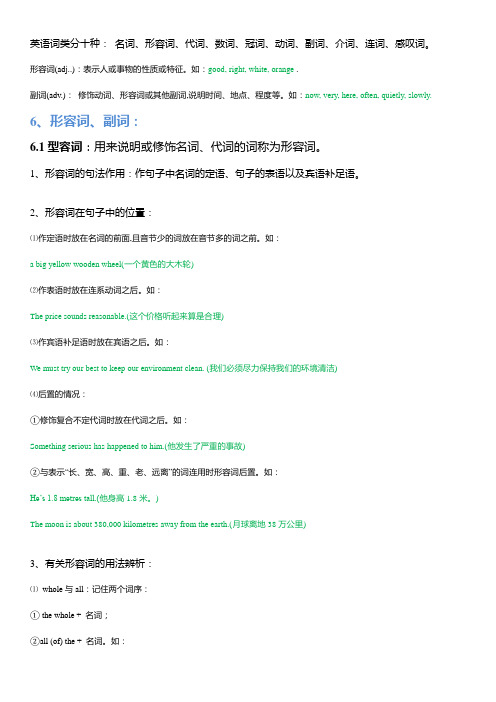
英语词类分十种:名词、形容词、代词、数词、冠词、动词、副词、介词、连词、感叹词。
形容词(adj..):表示人或事物的性质或特征。
如:good, right, white, orange .副词(adv.):修饰动词、形容词或其他副词,说明时间、地点、程度等。
如:now, very, here, often, quietly, slowly.6、形容词、副词:6.1型容词:用来说明或修饰名词、代词的词称为形容词。
1、形容词的句法作用:作句子中名词的定语、句子的表语以及宾语补足语。
2、形容词在句子中的位置:⑴作定语时放在名词的前面,且音节少的词放在音节多的词之前。
如:a big yellow wooden wheel(一个黄色的大木轮)⑵作表语时放在连系动词之后。
如:The price sounds reasonable.(这个价格听起来算是合理)⑶作宾语补足语时放在宾语之后。
如:We must try our best to keep our environment clean. (我们必须尽力保持我们的环境清洁)⑷后置的情况:①修饰复合不定代词时放在代词之后。
如:Something serious has happened to him.(他发生了严重的事故)②与表示―长、宽、高、重、老、远离‖的词连用时形容词后置。
如:He‘s 1.8 metres tall.(他身高1.8米。
)The moon is about 380,000 kilometres away from the earth.(月球离地38万公里)3、有关形容词的用法辨析:⑴whole与all:记住两个词序:① the whole + 名词;②all (of) the + 名词。
如:He was busy the whole morning.(整个早晨他都很忙)He can remember all the words he learns.(他能记住学过的所有单词)⑵tall与high, short与low:指人的个子时用tall与short;指其他事物时一般用high与low。
形容词副词单词
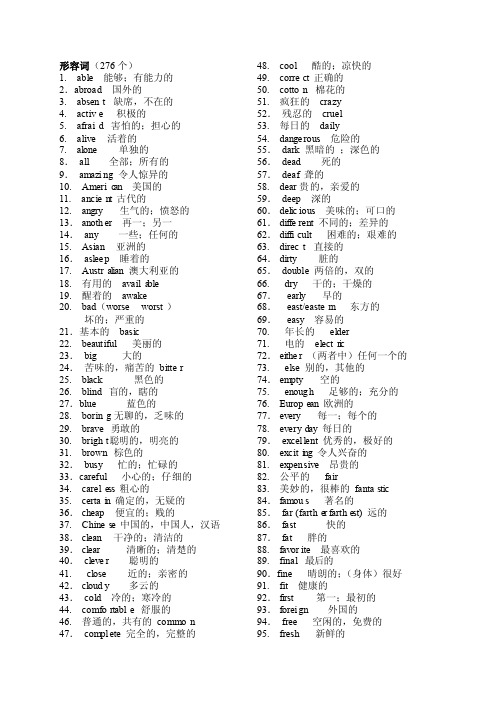
形容词(276个)1. able 能够;有能力的2.abroad国外的3. absent缺席,不在的4. active积极的5. afraid害怕的;担心的6. alive活着的7. alone单独的8.all 全部;所有的9.amazin g 令人惊异的10. Americ an 美国的11. ancien t 古代的12. angry生气的;愤怒的13. anothe r 再一;另一14.any 一些;任何的15. Asian亚洲的16.asleep睡着的17. Austra lian澳大利亚的18. 有用的availa ble19. 醒着的awake20. bad(worseworst)坏的;严重的21.基本的basic22. beauti ful 美丽的23.big 大的24.苦味的,痛苦的bitter25. black黑色的26. blind盲的,瞎的27.blue 蓝色的28. boring无聊的,乏味的29. brave勇敢的30. bright聪明的,明亮的31. brown棕色的32.busy 忙的;忙碌的33.carefu l 小心的;仔细的34. carele ss 粗心的35. certai n 确定的,无疑的36. cheap便宜的;贱的37. Chines e 中国的,中国人,汉语38. clean干净的;清洁的39. clear清晰的;清楚的40.clever聪明的41. close近的;亲密的42. cloudy多云的43.cold 冷的;寒冷的44. comfortable舒服的46. 普通的,共有的common 47.comple te 完全的,完整的48. cool 酷的;凉快的49. correct 正确的50. cotton棉花的51. 疯狂的crazy52.残忍的cruel53. 每日的daily54. danger ous 危险的55.dark 黑暗的;深色的56.dead 死的57.deaf 聋的58. dear贵的,亲爱的59.deep 深的60. delici ous 美味的;可口的61. differ ent 不同的;差异的62. diffic ult 困难的;艰难的63. direct直接的64. dirty脏的65.double两倍的,双的66. dry 干的;干燥的67.early早的68.east/eastern东方的69.easy 容易的70. 年长的elder71. 电的electr i c72. either(两者中)任何一个的73. else 别的,其他的74. empty空的75. enough足够的;充分的76. Europe an 欧洲的77. every每一;每个的78. everyd ay 每日的79.excell ent 优秀的,极好的80. exciti ng 令人兴奋的81. expens ive 昂贵的82. 公平的fair83. 美妙的,很棒的fantastic 84. famous著名的85.far (farthe r farthe st) 远的86.fast 快的87.fat 胖的88. favori te 最喜欢的89. final最后的90.fine 晴朗的;(身体)很好91. fit 健康的92. first第一;最初的93. foreig n 外国的94.free 空闲的,免费的95. fresh新鲜的96. friend ly 友好的97. front前面的;前部的98.full 满的;饱的99. funny有趣的,滑稽的100. genera l大体的,笼统的101.glad 高兴的;乐意的102. gold/golden金的,金色的103.good (better best) 好的104. great伟大的;重要的105. green绿色的106.half 半;一半107.英俊的handsom e108. happy高兴的;幸福的109.hard 硬的,困难的110. health y健康的111. heavy重的112. helpfu l有帮助的113.high 高的114. honest诚实的115.hot 热的116. huge 巨大的,庞大的117. human人类的118.. hungry饥饿的119.ill 生病的;不健康的120. import ant 重要的121. impossi ble不可能的122.Indian印度人(的)123. intere sted感兴趣的、124. intere sting有趣的125. 国际的intern ation al126. italic斜体的127. Japane se 日语,日本人(的)128. kind 友好的;和善的129. large大的;巨大的130.last 最后的;最近的131.late 迟的;晚的132.lazy 懒惰的133.left 左边的134. light明亮的,轻的;浅色的135.little(less least)小的;少的136.lively有活力的,活泼的137. lonely孤独的,寂寞的138. long (距离)长的/远的139.loud 大声的;响亮的140. lovely美好的,可爱的141.low 底的;矮的142. lucky运气好的;幸运的143. mad 发疯的,生气的144.有魔力的magic145. main 主要的146. many 许多的147. 医学的medical148. medium中等的149. metal金属制成的150. more 更多的,较多的151. most 最多的152. modern现代的153.much 许多的;大量的154.nation al 国家的,民族的155. natura l 自然的156. near 近的157. necess ary 必要的158. neithe r (两者)都不159. nervou s 紧张的,不安的160.new 新的;新鲜的161.next 下一次的;紧挨的162.nice 好的;漂亮的,令人愉快的163. no 没有的164.normal正常的165. north/northern 北方的166.old 旧的;年老的167. only 唯一的;仅有的168.open 开着的;开口的169. orange橙色的170. other别的;另外的171.苍白的pale172. patien t 有耐心的173. perfect 完美的,极好的174. pink 粉红色的175. plasti c 塑料的176. pleasa nt 令人愉快的177. polite有礼貌的178.poor 贫穷的179. popula r 流行的180. possib le 可能的181. pretty漂亮的182.初等的,初级的pri mary183. 私人的private /person al184. proper恰当的,合适的185. proud自豪的186. public公众的187. purple紫色的188. quick快的;迅速的189. quiet安静的190.rainy下雨的,有雨的191. 快速的,飞快的rapid192. ready准备好的193. real 真实的,确实的194.近来的,最近的recent 195. red 红色的196.rich 富裕的;有钱的197. right右边的;正确的198. round圆的;球形的199.Russia n俄国人(的)200. sad 悲伤的;使人悲伤的201. safe 安全的202.same 同样的203. second第二的204.单独的,分开的separa te 205. seriou s 严重的;认真的206. severa l 几个的207. short短的;矮的208.shy 害羞的209. sick 生病的;有病的210. silent无声的211. silly傻的,愚蠢的212. 相似的simila r213. 简单的simple214. single单一的,单个的215. 困倦的sleepy216. slow 慢的;缓慢的217. small小的;少的218. smart灵巧的,聪明的219. 光滑的smooth220. snowy雪白的,多雪的221. 社会的social222. 柔软的soft223. 固体的solid224. some 一些;若干225. sorry对不起的;难过的226. sour 酸的227.south/southe rn 南方的228. 空闲的,多余的spare229. specia l特殊的230. strang e 奇怪的,陌生的231. strict严格的232. strong强壮的,坚强的233.愚蠢的stupid234. succes sful成功的235. such 这样的;如此的236. 突然的sudden237. sunny晴朗的238. sure 肯定的;确信的239. sweet甜的240.tall 高的241. terrib le 可怕的,糟糕的242. that 那;那个243.these那些244. thick厚的245.thin 瘦的;薄的246. thirst y 口渴的247.this 这;这个248. those那些249. tidy 整洁的,干净的250. 极小的tiny251. tired疲劳的;累的252. 总数的,总括的total253. 传统的traditi onal254. true 真的;真实的255. 丑陋的ugly256. 地下的underg round257. used 用过的,旧的,二手的258. useful有用的;有益的259. usual通常的;平常的260.warm 暖和的;热情的261.weak 差的;弱的262.welcom e 受欢迎的263. well(better best)身体好的264.west /western西方的265. wet 湿的;潮的266. which哪一个;哪些267. white白色的268. whole整个的269.wide 宽的;宽阔的270.windy有风的,多风的271. 英明的wise272. wonder ful 极好的;精彩的273.worth有价值的274. wrong错误的;不对的275. yellow黄色的276. young年轻的副词(91个)1. about大约;到处2. after在后;后来3. again再一次;再;又4. ago 以前5. almost/nearly几乎;将近6. along沿着7. aloud大声地8. alread y 已经9. also 也10. always总是;永远11. anyway不管怎样12. anywhe re 任何地方13. around在周围;在附近14. away 离开;远离15. back 向后;回原处16. before以前17. carefu lly 认真地,小心地18. carele ssly粗心地19. certai nly 当然20. clearl y 清晰地,清楚地21. correctly 正确地22. deep 深地23. differ ently不同地24. down 向下25. downst airs在楼下,到楼下26. early早地27. either也(否定句尾)28. enough足够地;充分地29. especi ally尤其,特别30. even 甚至;更31. ever 曾经;无论何时32. everyw here到处33. far 远地34. fast 快地;迅速地35. finall y 最后地36. first第一,首先37. 向前,将来forwar d38. hard 努力地;(雨/ 雪)猛烈地39. hardly几乎不40. here 这里;在这里;向这里41. home 回家;到家42. how 怎样;多少43. 立即immedi ately44. instea d 代替;顶替45. just 正好;刚才;仅46. last 最后地;刚过去地47. late 迟地;晚地48. later之后;过后49. low 低;矮50. mainly主要地43. maybe可能,大概44. never决不;从来不45. next 随后;下一步46. now 现在47. off 离开,(电/ 自来水)停了48. often经常49. once 从前50. only 只;仅仅51. out 离开;向外;在外52. outsid e 在外面53. over 结束;遍布54. perhap s 可能;也许55. polite ly 有礼貌地56. probably 可能地57. quickl y 快地;迅速地58. quite完全;十分59. rather相当;宁可60. really真正地;确实61. recently 最近地62. right正确地;恰恰63. safely安全地64. 很少seldom65. since从那时起66. slow 慢地;缓慢地67. so 如此;这么68. someti mes 有时69. soon 很快;不久70. still仍然;还71. strong ly强烈地72. succes sfull y 成功地73. such 那么74. sudden ly 突然75. then 那时;然后76. there在那里77. throug h 自始至终78. today今天;现在;当前79. togeth er 一起,共同80. tomorr ow 明天81. tonigh t 今晚;今夜82. too 也;太83. twice两次;两倍84. usuall y 通常;经常85. very 很;非常86. well 好地87. when 什么时候88. where在哪里89. why 为什么90. widely广泛地91. yet 还;仍然。
小学语法---形容词和副词

小学语法---形容词和副词未来之星——小学语法——形容词和副词形容词和副词是英语中常用的词性,它们分别用来修饰名词和动词,下面将详细介绍它们的概念和用法。
一、形容词、副词的概念形容词是用来描述人或事物的性质、特征和状态的词语,通常用来修饰名词或代词。
副词是用来说明事情发生的时间、地点、原因、方式等含义的词语,通常用来修饰动词或整个句子。
二、形容词、副词的用法1.形容词作定语形容词一般用来修饰名词或代词,放在它们的前面,表示“……的”意思。
例如:a nice watch(一只漂亮的手表)an empty box(一个空箱子)a clever boy(一个聪明的男孩)a beautiful girl(一个美丽的女孩)us food(可口的食物)an interesting book(一本有趣的书)a blue car(一辆蓝色的小汽车)an exciting speech(一次令人兴奋的演讲)注意:当形容词修饰不定代词(someone。
somebody。
something。
anyone。
anybody。
anything。
nobody。
nothing)时,需要置于其后。
例如:something important(重要的事情)nothing interesting(没有什么有趣的)2.形容词作表语有些形容词只能作表语,放在系动词之后,例如:XXX.(这些花是蓝色的。
)Bob looks smart today.(今天XXX看上去很精神。
)还有一些形容词只能作表语,放在系动词之后,例如:XXX等。
The boy is asleep.(男孩正在睡觉。
)Lucy and Lily look XXX.(XXX和XXX长得很像。
)XXX.(她的母亲病了。
)3.形容词做宾语补足语形容词还可以作为宾语补足语,放在宾语之后,用来补充说明宾语的状态、特征等。
通常用于make / paint / keep / find / want / like等动词后接名词或代词作宾语。
形容词和副词的比较级和最高级(完美版)

形容词、副词的比较级和最高级一.形容词和副词的比较级和最高级的变化方法如下(1) 符合规则的:( 1)和冠词连用the +形容词原级+v(复),指一类人或物the +形容词比较级,指两者中“较…的”的那一个,eg. the younger of thea/ an +形容词比较级eg. The pen is expensive. I want a cheaper one.( a) +most+形容词最高级“非常…”eg. a most beautiful city( 2 ) 相关结构a. 原级比较:肯定句as….as…., 否定句not so / as….as…..b.比较句:比较级+than….或more (less) ….than…..The furniture in this shop is less beautiful than that in that shop.c.比较级+and+比较级或more and more+比较级“越来越… ”richer and richer, more and more interestingd. The more….., the more…..“越…,越…”The more you look at the picture, the better you will like it.e. 比较级+than any other +n. (单)(适用于范围一致时)(all) other +n.(复)any +n.(单) (适用于范围不一致时)He is taller than any other student / all other students in his class.any student in my class.f. 倍数表达法。
A is three(four, etc.)times the size(height, length etc.)of B.A is three(four, etc.)times as big(high, long, etc.)as B.A is three (four, etc.)times bigger(higher, longer, etc.)than B.用times 表倍数通常用于三倍以上,两倍可以用twice或double.The new building is four times the size (the height)of the old one.Asia is four times as large as Europe.Your school is three times bigger than ours.g. 最高级+of/ in/ among….He is the tallest of the three/ among them/ in is class.形容词、副词的比较级和最高级专项练习(一)写出下列形容词与副词的比较级与最高级形式:long __ wide __ ___ fat _ ___ heavy _____ ____ slow _____ ____ few _____ ____ brightly ___ _____ important ___ _____ far ____ ______ quickly ____ ____ happy ___ ____ many _______interesting __ __good ___ ___(二)用所给词的正确形式填空:1. He ran ______ than all the others. He ran _______ of all. ( fast )2. James played as ______ as you. Mary played _______of all. ( well )3. She waited ________ than she usually did. ( long )4. I walked _______ than the rest. I walked _______ of all. ( far )5. My friend came ________ than Pual and Mike. ( late )6. Among the three boys he works ________. ( hard )7. Bob left school ______ in his class yesterday. ( late )8. He swims as ______ as I do. ( badly )9. Who did _______ in the 100-metre race, Jim or Tim? ( badly )10. Both Li Ming and Li Hong sang __________, but I sang _______ of all. ( badly )11. Peter is as _______ as Tom. Benny is _____ than Tom. David is ______ of all. ( fat )12. Li Li found _________ mushrooms than I did. ( many )13. The elephant is ________ than any other animals. ( big )14. Man is ________ than animals. ( much clever )15. Lesson Two is a bit ________ than Lesson One. ( easy )16. I’m _______ boy under the sun. ( happy )17. Today is ________ than yesterday. ( hot )18. An elephant is _______ than a tiger. It is _______ animal on land. ( big )19. Mr. Li is _______ than your uncle. ( thin )20. Which book is _________, yours or mine? ( thick )21. This park is much _______ than that one. ( beautiful )22. The first book is more useful than the second one.The second book is ______ than the first one. ( useful )23. Allan is _______ of the three boys. ( strong )24. His marks are _______ than his friend’s ( bad )25. It is _______ to do this maths problem than to do that one. ( easy )26. My house is ________ to the farm than yours. ( far )27. My work is more important than yours. Your work is ________ than mine. ( important )28. Climbing this hill is _________. Climbing that hill is ________. Climbing Mt. Everest is _______ ofall. ( dangerous )29. Mt. Everest is _________ than the Mont-Blanc. ( high )30. My mother drives very carefully. She is a _________ driver than my father. ( careful ).31. Of the two girls, I find Lucy the _______ (clever).32. Gold(黄金) is ______ (little) useful than iron(铁).33. My sister is two years _______ (old ) than I.34. John’s parents have four da ughters, and she is the _____ (young) child.35. The _____ (cheap) bags are the not usually the best ones.36. The short one is by far _______ expensive of the five.37. The boy is not so ______ (interesting) as his brother.38. Dick sings _____ (well), she sings ______(well) than John, but Mary sings______(well) in her class.39. She will be much ______ (happy) in her mew house.40. This dress is ______ that.(twice, as…as…, expensive)(三)选择填空:1. He feels _____ today than yesterday. A. tired B. more tired C. more tireder D. much tired2. Which do you like _____, coffee, tea or milk? A. the worst B. worse C. the worse D. worst3. Of the two toys, the child chose_____.A. the expensive oneB. one most expensiveC. a least expensiveD. the most expensive of them4. The line is ____ than that one. A. more longer B. not longer C. much more longer D. many more longer5. The earth is _____ the moon.A. as 49 times big asB. 49 times as bigger asC. 49 times as big asD.as big as 49 times6. The book is ____ of the two. A. thinner B. the thinner C. more thinner D. the thinnest7. She looks _____ than she does. A. the more older B. very older C. much older D. more older8. The garden is becoming ______.A. more beautiful and moreB. more beautiful and beautifulC. more and more beautifulD. more beautiful and beautifuler9. They competed(比赛)to see who could work _____.A. the fastest and bestB. the faster and the betterC. fastest and betterD. faster and better10.______ hurry, _______speed. A. More, less B. Much, little C. The more, the less D. The much, the little11. This kind of coffee is different ______.A. and it is also betterB. and better than the otherC. but also than othersD. from the other, and better(四)翻译句子:1.本书跟那本书一样有趣。
副词与形容词的用法

副词和形容词一、形容词的用法1.形容词修饰名词;并且放在名词的前面;这时形容词在句子中作定语例如: a beautiful lady、a tall man、a big houseA beautiful lady is standing in front of a tall man.2.形容词放在be动词的后面;这时形容词在句子中作表语/主语补足语..例如:The lady is tall. tall在句子中作表语;说明lady是怎么样的The beautiful lady is tall. beautiful在句子中作定语;tall作表语The beautiful lady is tall and slim.3.形容词放在连系动词become成为、seem看起来、taste尝起来、look看起来、smell闻起来、feel摸起来/感觉、turn变成;等等后面;在句子中作表语/主语补足语..例如:The leaf 叶子 turned yellow.树叶变黄了..She looks beautiful./ He looks handsome. 她看起来漂亮../他看来帅气..The food taste good. 这些食物好吃..The sweater feels soft. 柔软的;舒服的He becomes careful. 小心的他变得小心了..The flower smells very good. 花闻起来很香..Everything seems good. 一切看起来都好..二、副词的用法1.副词修饰动词;并且通常放在实义动词后面;这是副词在句子中作方式状语..例如:The man runs fast. fast修饰runs这个动作She jumps high. high修饰jump这个动作He finished his homework quickly. quickly修饰finished 这个动作2.副词修饰形容词;并且通常放在形容词的前面例如:He becomes very handsome.She looks very beautiful.The lady is very tall and slim.在“副词+形容词”这样的结构中;中心词是形容词;副词只是为了说明程度大小即:very handsome的中心词是handsome3.副词前面也可以加副词;例如上面的句子都可以改写成:The man runs very fast.She jumps very high.He finished his homework very quickly.very本身是副词;意思是“非常;很”;所以后面也可以跟副词或者形容词..三、填形容词还是副词动词后面一般都跟副词;但不是所有动词后面都跟副词;实义动词后面跟副词;连系动词后面跟形容词..例如:She sings beautifully. sing是实义动词;beautiful用来说明唱得如何Tom draws well.draw是实义动词;well用来说明画得如何My teacher is young and tall.is是系动词;后面跟形容词 She looks sad. look是连系动词;后面跟形容词还有一些不是连系动词的词;例如make和get;要根据句子的意思判断填形容词还是副词..区分:He is making a kite carefully.carefully用来修饰make这个动词He made the teacher angry.angry是指the teacher;而不是修饰make这个动词The student got quiet when the teacher came in.quiet是指the student;而不是修饰got这个动词I get up early.early修饰动词get upShe leaves the room quickly.quickly修饰leave这个动词 Please leave the door open.open是指the door;而不是修饰leave这个动词于是有词组:make sb+adj. leave sb+adj. get+adj因此;填形容词还是副词;首先要弄清楚句子的意思;判断所修饰的成分是名词/代词还是动词;修饰前者的用形容词;修饰后者的用副词..四、形容词和副词分别长什么样子1.形容词的词尾通常有ing/ful/ed/yinteresting、tiring、boring、exciting、surprising、amazing与物有关interested、tired、bored、excited、surprised、amazed与人有关careful、hopeful、wonderful、helpful、colorful、meaningful、beautifulrainy、windy、cloudy、dry、messy、easy、funny、busy、angry区分:The children were excited when they heard the exciting news.The man was tired劳累的 after doing so many tiring累人的 jobs.但是在interesting与interested中;形容人或物的都用interesting;而interested常以词组be interested in的形式出现;表示“对…感兴趣”..The story is interesting./The teacher is interesting.I am interested in reading.2.副词的词尾通常是ly;但亦有一些不以ly结尾的副词..badly、surprisingly、carefully、hopefully、quickly、greatly、possibly通常是由形容词加ly变来hard努力地、well好、high高、fast快地、pretty十分;非常、very much/a lot非常a little一点3.有些词既是形容词也是副词hard adj.硬的 adv.努力地 early adj.早的 adv.早地high adj.&adv. 高well adj.健康地 adv.好I doesn’t feel well.我觉得不舒服..Well done.做得好late adj.迟的 adv.迟 be late for school 上学迟到1. Look at the children on the playground. They are flying kites ________happy.3. Why do you think you did so ___________badin your test5. We can __________easy forgive a child who is afraid of the dark; but we can’t forgive an adult who is afraid of t he light.6. Congratulations You’ve answered all the questions _________correct.7. The computer is ______wideused in our daily life. We can do many things with it.8. I changed into my sports shoes so that I could walk more ____________comfortable.9. Mary passed her examination because she studied very ________hard.10. “Why didn’t you tell me earlier ” The boss shouted _______hungry.12. It’s ___true possible that robot teachers will be popular in schools some day.13. How _________comfortable the giant pandas are living in Taiwan14. Miss Xu smiled and said to me ________soft; “Never mind; my boy”15. Last night it rained __________heavy in the southern part of the city.17. Simon hates to be like others; he often tires to do everything ______different.19. The children clapped their hands _________excited as soon as the astronauts appearedon the stage.20. Tom had an accident yesterday. His teacher sent him to the hospital ____quick.21. We should speak to the old man _________polite23. I’m _______true sorry I can’t go with you. I have a lot to do this afternoon.25. His father was looking _________ angry at him because he had made a serious mistake.26. Mike walked _______quiet into the room not to wake up his grandpa.27. How _______quick Betty answered the teacher’s question28. The firemen have saved the boy from the fire ____________successful.29.She is an __________ teacher because she often tells ___________stories every day. interest30.The children were ___________ about the _____________ news.excite31.The woman looks ___________. beauty32.The teacher got ____________ anger because the boy didn’t finishhis homework in time.33.The boy told his father ________________ excite; “I got a fullmark in the exam”34.It is ___________ for the boy to finish such a task.difficulty35.The mother is __________ about her son’s safety.worry。
高中英语形容词与副词区分
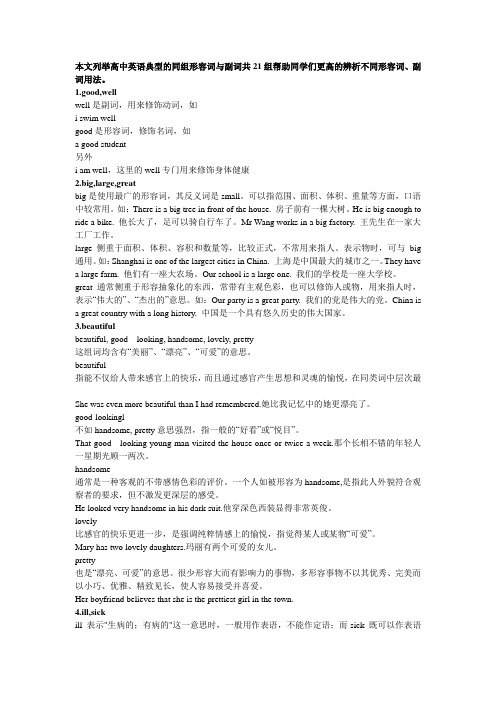
本文列举高中英语典型的同组形容词与副词共21组帮助同学们更高的辨析不同形容词、副词用法。
1.good,wellwell是副词,用来修饰动词,如i swim wellgood是形容词,修饰名词,如a good student另外i am well,这里的well专门用来修饰身体健康2.big,large,greatbig是使用最广的形容词,其反义词是small。
可以指范围、面积、体积、重量等方面,口语中较常用。
如:There is a big tree in front of the house. 房子前有一棵大树。
He is big enough to ride a bike. 他长大了,足可以骑自行车了。
Mr Wang works in a big factory. 王先生在一家大工厂工作。
large侧重于面积、体积、容积和数量等,比较正式,不常用来指人。
表示物时,可与big 通用。
如:Shanghai is one of the largest cities in China. 上海是中国最大的城市之一。
They have a large farm. 他们有一座大农场。
Our school is a large one. 我们的学校是一座大学校。
great 通常侧重于形容抽象化的东西,常带有主观色彩,也可以修饰人或物,用来指人时,表示“伟大的”、“杰出的”意思。
如:Our party is a great party. 我们的党是伟大的党。
China isa great country with a long history. 中国是一个具有悠久历史的伟大国家。
3.beautiful这组词均含有“美丽”、“漂亮”、“可爱”的意思。
beautiful指能不仅给人带来感官上的快乐,而且通过感官产生思想和灵魂的愉悦,在同类词中层次最She was even more beautiful than I had remembered.她比我记忆中的她更漂亮了。
- 1、下载文档前请自行甄别文档内容的完整性,平台不提供额外的编辑、内容补充、找答案等附加服务。
- 2、"仅部分预览"的文档,不可在线预览部分如存在完整性等问题,可反馈申请退款(可完整预览的文档不适用该条件!)。
- 3、如文档侵犯您的权益,请联系客服反馈,我们会尽快为您处理(人工客服工作时间:9:00-18:30)。
To understand the usage of grammar
课型
New lesson
教具
PPT
实训内容
形容词,副词
课堂组织
形式
1. individual work
2. pairs work
教师教的过程设计
学生学的过程设计
设计意图
时间
Part one: Lead-in
Ask the students to learn the definition ofadjective and adverb.
课后训练及作业
the textbook
教学反思及小结
enough、nearby修饰名词前置或后置,程度副词一般位于形容词、副词前面,enough修饰形容词、副词时,必须后置
教师课时教学设计
教学日期
2015年4月20
学习班级
GZ131 GZ132 GZ133
学习地点
E501 E502 E503
教学内容
语法复习专题——形容词,副词(1/4)
教学目标
知识能力:
To understand the functions ofgrammar.
To understand the usage of grammar
Part two: presentation of the grammar
Understand the usage of preposition.
(1)形容词短语作定语,定语后置。
(2)表语形容词作定语,定语后置。
用作定语,修饰由不定代词one、no、any、some和every构成的复合词如anything、something等时,通常后置。
(4)else常用作疑问代词和不定代词的后置定语。
(5)enough、nearby修饰名词前置或后置,程度副词一般位于形容词、副词前面,enough修饰形容词、副词时,必须后置。
(6)几个副词并列作状语时,其顺序较灵活,但一般是:方式→地点→时间。
(7)频度副词如often、always、usually等在be动词后,行为动词前。
过程和方法:
Lead-in
Presentation of the grammar
Summary and exercises
Байду номын сангаас情感态度和价值观:
To distinguish thegrammar.
To get prepared for the college entrance exam
教学重点
To understand the functions ofgrammar.
(8)副词作定语,定语后置。
(9)几个并列的形容词作定语,其语序
Part three: Summary and homework.
Part five:
Make Comments on the exercises and homework.
1.概念:形容词是表示人或物的特征的词,用来修饰名词和不定代词。
(9)几个并列的形容词作定语,其语序通常为:限定语(The、A)+描绘性形容词+ size(大小)+ shape(形状)+ age(年龄、时间)+ color(颜色)+ origin(国籍、来源)+ material(材料)+ purpose(目的)+名词。如:
a heavy black Chinese steel umbrella,
(3)用作定语,修饰由不定代词one、no、any、some和every构成的复合词如anything、something等时,通常后置。如:
I have something important to tell you.
(4)else常用作疑问代词和不定代词的后置定语。
(5)enough、nearby修饰名词前置或后置,程度副词一般位于形容词、副词前面,enough修饰形容词、副词时,必须后置。
, and ask students to master the grammar.
.
3. To understand the functions of adjective and adverb.
To summarize some usages of adjective and adverb.
To consolidate the grammar through doing some exercises
(6)几个副词并列作状语时,其顺序较灵活,但一般是:方式→地点→时间。如:
We had a good time together outdoors last Sunday.
(7)频度副词如often、always、usually等在be动词后,行为动词前。
(8)副词作定语,定语后置。如:
The person there is waiting for you.
the man’s first tow interesting little red French oil paintings
Do some exercises.
Comment on exercises
1.Understand what’s called adjective and adverb.
2. Tounderstand the usage ofadjective and adverb.
副词主要修饰动词,形容词和副词,也可以修饰名词或全句。
2、形容词、副词的作用与位置
(1)形容词短语作定语,定语后置。
a language difficult to master, a leaning tower about180 feethigh
(2)表语形容词(afraid、alike、alone、asleep、awake、alive等)作定语,定语后置。如a man alive。有些表身体健康状况的形容词如well、faint、ill只作表语。sick既可作表语又可作定语,ill如作定语意为“bad”。
